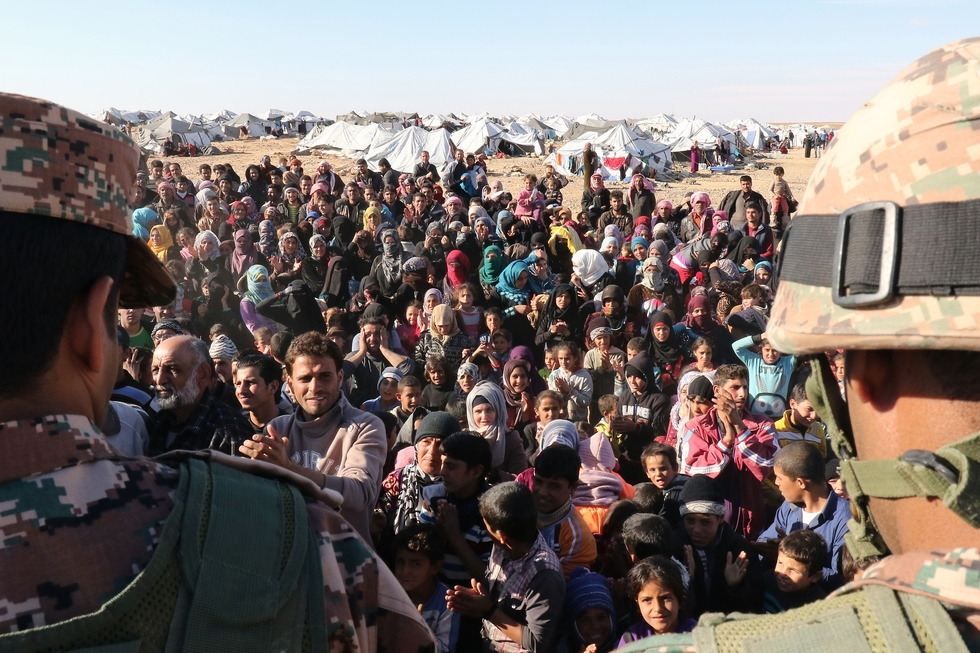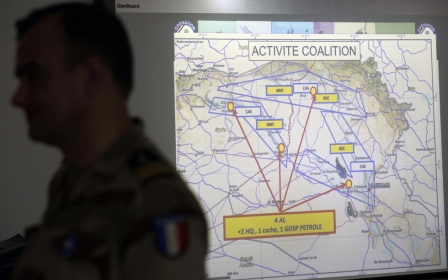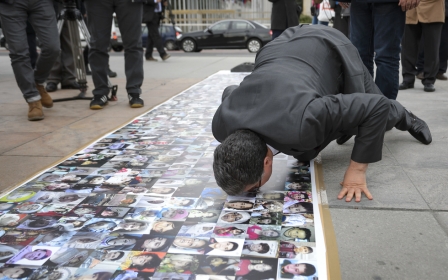Exodus and betrayal: How a Syrian Nakba was created

US Secretary of State John Kerry came close to revealing his true thoughts when he was accosted by two Syrian aid workers at a reception in London after the collapse of the Geneva talks last week.
The Syrians accused him of doing nothing to protect civilians from the onslaught they are facing in Aleppo. Kerry replied: "Don’t blame me – go and blame your opposition," laying the fault for the government's offensive on the opposition walking out of the talks.
Kerry got flustered in the encounter: "What do you want me to do? Go to war with Russia? Is that what you want?" the aid worker said Kerry told her. Kerry then anticipated three months of bombing during which time "the opposition will be decimated".
Kerry’s off-mic encounter deviated significantly from the official line which was that Russia and Iran had offered Washington a ceasefire. Kerry’s remarks differed also from the State Department mantra that the brutality of Assad against the Syrian people had helped foster the growth of the Islamic State group. Apparently now, Syrians who resisted Assad’s brutality were responsible for the barrel bombs being dropped on them.
After multiple avowals that Assad’s army was on the point of collapse and the ill-fated CIA training programmes, Syrian rebels are being sold down the river by the country that urged them to rise up five years ago.
The Deraa protests started peacefully. To that everyone attests. Four factors turned those protests into an armed uprising: the brutality of the regime’s response, Assad’s decision to release Jihadis from Sednaya Prison, an act which "Islamised" the opposition, the Libyan intervention, and the intervention of foreign powers - Iran and Saudi Arabia.
The scenes today on the Turkish border are a direct consequence of Obama’s "intervention-lite" in Syria - a drip feed of weapons - but only 16 bullets per fighter per month. The Free Syrian Army has reportedly stopped receiving weapons for four months. In Libya, Obama boasted he was leading from behind. In Syria he is now wringing his hands from behind.
There can be little doubt that Kerry’s policy is twisting in the wind as a result of the Russian intervention. That much was evident from Kerry’s meeting with Riyad Hijab, general coordinator of the High Negotiations Committee, the body formed in Riyadh in response to American pleas for unity.
Kerry told Hijab that talks must begin before the bombardment stopped; that there was no timetable for Assad’s departure; that the objective of the talks would be nothing less than a national unity government; and that the failure of the opposition to go to Geneva would mean US cutting off aid to the opposition. Michael Ratney, the US special envoy to Syria, attempted to smooth things over by claiming there had been a misunderstanding caused by bad translation. But Hijab understood Kerry all too clearly.
Kerry’s Damascene conversion took place in four stages. The first was Assad’s chemical attack on opposition positions in Ghouta, east of Damascus, which paved the way for Russian mediation which persuaded Assad to give up his stockpile of chemical weapons. This gave Russia a good argument to use with Kerry who refused at the time to recognise Assad’s authority: if Assad was legitimate enough to negotiate with over the surrender of his chemical stockpile, he surely had to remain as head of a transitional government.
Either way he had to be recognised as the de facto head of state. This is the logic Kerry has now accepted.
The second was Mosul, a city held by four divisions of the Iraqi army trained by the US to the tune of $25bn which was captured by 350 IS fighters. The third was the Russian intervention on 30 September and the final nail in the coffin of Kerry’s Syria policy was the attacks in Paris in November. Gradually Kerry began to see Assad as the lesser of two evils. Kerry bought into Sergei Lavrov’s line that Russia had saved Damascus from falling into the hands of IS.
Kerry has come dangerously close to seeing the Syrian conflict as a binary fight between two forms of ruthless dictatorship - Assad and IS. This is exactly how Assad himself, Russia, Iran and many of the other Arab autocracies, in Egypt and the Emirates and Jordan, frame the conflict. And it is one of the main reasons why IS is growing from strength to strength.
To see the civil war through this prism, you have to persuade yourself that the opposition to Assad consists exclusively of Salafi jihadi extremists, supported by the Wahabi doctrines of Saudi Arabia and the imperial conceit of Erdogan’s Sultanate in Turkey. You have to persuade yourself that the Syrian rebels, like IS, want to impose a brutal theocracy on a secular state.
You have, in short, to airbrush out of this landscape the faces and views of the majority Sunni population. You have to turn a deaf ear to the testimony of 4.6 million refugees registered with the UNHCR. Nor are they the last. Another exodus is on its way in Aleppo. There are 150,000 civilians in rebel-held eastern Aleppo and up to 250,000 others in the area. Some 70,000 are heading to the Turkish border as a result of the Russian bombing and government advances and 31,000 are waiting at the border.
The Turkish Deputy Prime Minister Numan Kurtulmus said on Monday that 600,000 could be heading towards Turkey.
Testimony of the refugees
Why do they flee? From whom are they fleeing? Are they forced out by jihadis imposing Sharia law? Are they fleeing the warm embrace of a liberal, secular multi-confessional republic, as Assad likes to present himself? If the Syrian army is a disciplined force, as its apologists maintain, why are hundreds of thousands of civilians so terrified of being liberated by it?
I spent a week in the refugee camps on Jordan’s northern border asking these questions, going from tent to tent in search of answers. The following is a representative sample of the replies I got.
Meteb was a civil servant, the head of the transportation department in Baba Amr. Homs became the epicentre of anti-government protests, after protests in Deraa had been quelled by a large-scale military operation. A Free Syrian Army brigade formed by defecting Syrian Army officers ambushed government forces around Baba Amr in October 2011 and defended the neighbourhood. When an Arab peace mission failed - the Syrian army hid their tanks under fake sand dunes to conceal their presence from the monitors, witnesses claimed - the army launched an offensive in February 2012.
"For six months there were no arms whatsoever. People only started using arms when they witnessed the brutality of the regime. The police would undress the women, force them to strip and put them on the tanks for people to watch," Meteb said.
Meteb’s life was saved by an officer commanding the operation: "They (the Syrian Army) went through our village from house to house, arresting or shooting. They wanted to teach the area a lesson. I was one of 16 who were taken away by the commanding officer. I don’t know why I was spared. It was God’s will. All the rest were sprayed with machine gun fire. They shot people in their homes and left their bodies there to rot. Many of my cousins and the women in my family were killed. 1,661 people were massacred on that day."
Each refugee had a precise date etched in their mind. Meteb’s was February 2012. Anud’s was 6 December 2013. This is when she got out with her husband and eight children by moving at night from village to village. She remembered: "They put a man up against a fence and used him for target practice. The soldiers actually took bets on who would hit him." Mohammed recounted how two security guards were caught, strung up and dismembered with a chainsaw.
Anud said: "The army comes first followed by the Shabiha (sectarian militias paid by the state). We have no army any more. We have Iranians with their machetes. They just slaughter. If you surrender to them, they just slaughter you. I saw it with my own eyes. They chop off your right arm, or your head. There is no longer a Syrian army. The Iranians are the ones who are doing this. They are alien. They steal our goods. If you are tempted to defend yourself, they kill you, after that they loot your house and set it on fire."
Suleiman, who fled his village 27km from Aleppo, said: "The village is surrounded by mountains. We had no armed men, no terrorists. On 3 December 2012 the airforce dropped 42 barrel bombs on us and fired Grad rockets. About 1,500 people were killed."
Farhan, a farmer from the countryside of Homs, said: "We are farmers. We did not go after the regime. The regime came after us. They slaughtered us. If the regime came to provide protection, why did they bomb us, why did they lay siege to us, why did they stop the bread coming through?"
Samar was driving with her husband Said in a car with their four children when they drove into a checkpoint. Said was taken away. That was three years ago: "My husband was a farmer. I hope in God that one day he will come back. He is 37."
The stories go on and on. Tent after tent.
A report by the Human Rights Council of the UN gave people like Samar little hope. It found the Syrian government carried out "massive and systematised violence" in its prisons and detention centres which amounted to "extermination". Here are two snippets.
"In the Air Force Intelligence Branch in Aleppo, a detainee suffered severely from an infected wound in his leg sustained during torture. Unable to stand up, he was eventually placed in the corridor outside the cell, receiving no medical care. After a few days, fellow detainees observed that he was dead. His family was later able to obtain the body through unofficial channels. Due to marks of torture and the severe emaciation of his corpse, his family could first only recognise him by an identifying tag," the UN report reads.
"In 2014, a detainee held in a centre under the control of the 4th Division of the Syrian army had his genitals mutilated during torture. Bleeding severely and left without treatment, he died three days later. A detainee of a Military Security branch in Homs witnessed an elderly man being severely beaten, and then hung by his wrists from the ceiling. The guards burned his eyes with a cigarette, and pierced his body with a heated, sharp metal object. After hanging in the same position for three hours, the man died.
The UN did not spare al-Nusra, the al-Qaeda affiliated rebel group either. It stated: "On 9 July 2015, a Nusra-led alliance of armed groups captured the Abu Al-Douhour airbase (in Idlib province) from the Syrian army. Approximately 70 soldiers were executed on the runway, with al-Nusra publishing photographs of the corpses."
You get one word answers when you ask the Syrian refugees in Jordan, many of whom are spending their third winter in tents, what would persuade them to return.
Yasin, a builder who did not take part in the uprising and who lost three of his cousins in barrel bombs, said: "Peace and security." Could the Syrian Army provide that? Yasmin stared at me as if I were mad.
Was there any way Meteb could live under the control of the Syrian army? "No. Everyone here will tell you that." With a population of 80,000 al-Zaatari, Jordan’s biggest refugee camp, is now the size of a small city. There are tens of thousands outside.
Meteb thought a bit longer: "If there was a genuine national reconciliation, provided those who committed these crimes were brought to justice. We know the regime is ultimately responsible for these crimes. If no national reconciliation is achievable, it is impossible to co-exist."
New Palestinians
Assad has lost his legitimacy forever as far as these people are concerned, to say nothing of the majority community. There is no ceasefire nor a government of national unity in waiting that can undo this political fact. So, too, has the Syrian state, its army and its institutions lost much of its authority. These survive only through foreign intervention, that of Russia, Iran and Hezbollah. Fars, the official Iranian news agency, has stopped bothering to maintain the fiction that the Revolutionary Guards are present in Aleppo as "advisers".
It recently reported the deaths of General Mohsin Ghajarian and six "volunteers". AFP reported that more than 100 Iranian troops have died since the start of the Russian bombing campaign in September last year.
Russia’s claims to have saved the state rather than its leader are fatally flawed, not least by the targeting of their bombs. They have saved Assad’s neck, for now, at the cost of further weakening the Syrian state. Russia entered the conflict by saying there was no military victory possible. Assad now believes there is. With each exodus of refugees, the state weakens and the prospect of peace disappears.
Abandoned by the US, betrayed by Arab governments, shut out of Europe, these refugees are an increasingly significant political fact. The parallels exist between their fate and those of the Palestinians after the creation of Israel in 1948.
Both were majority populations driven out by a militarily superior colonial-backed force. Both were persuaded by Arab governments that they would return soon and that those Arab governments would do the fighting for them. Both have been betrayed.
- David Hearst is editor-in-chief of Middle East Eye. He was chief foreign leader writer of The Guardian, former Associate Foreign Editor, European Editor, Moscow Bureau Chief, European Correspondent, and Ireland Correspondent. He joined The Guardian from The Scotsman, where he was education correspondent.
The views expressed in this article belong to the author and do not necessarily reflect the editorial policy of Middle East Eye.
Photo: Syrian refugees, stuck between the Jordanian and Syrian borders, wait to cross into Jordan, at the Hadalat border crossing, east of the Jordanian capital Amman, on 14 January, 2016 (AFP).
New MEE newsletter: Jerusalem Dispatch
Sign up to get the latest insights and analysis on Israel-Palestine, alongside Turkey Unpacked and other MEE newsletters
Middle East Eye delivers independent and unrivalled coverage and analysis of the Middle East, North Africa and beyond. To learn more about republishing this content and the associated fees, please fill out this form. More about MEE can be found here.





